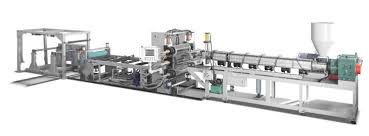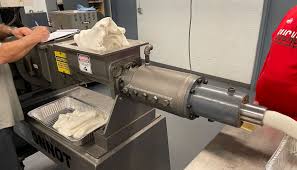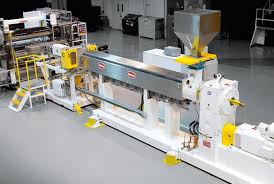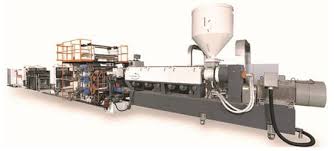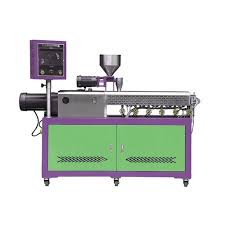In modern plastic manufacturing, the dubbele schroef plastic extruder machine—or twin-screw plastic extruder machine—is a game-changer. Known for its excellent mixing capabilities, process control, and adaptability, this machine is widely used in industries ranging from packaging and automotive to electronics and bio-materials.
Whether you’re compounding polymers, producing masterbatches, or recycling mixed plastics, a twin-screw extruder delivers efficiency, consistency, and precision.
What Is a Twin-Screw (Dubbele Schroef) Plastic Extruder?
A twin-screw plastic extruder features two parallel screws rotating inside a closed barrel. The screws may rotate in the same direction (co-rotating) or opposite directions (counter-rotating), depending on the application. These screws work together to melt, mix, and push the plastic material through a die to form sheets, pellets, pipes, or profiles.
This machine provides better dispersion and mixing than traditional single-screw extruders, making it ideal for processes that involve additives, fillers, or colorants.
Key Applications
Polymer Compounding: Mixing base resins with additives, stabilizers, or pigments.
Reinforced Plastics: Integrating materials like fiberglass or carbon fiber into polymers.
Masterbatch Production: Creating color and additive concentrates for further processing.
Plastic Recycling: Handling multi-material plastic waste with efficient degassing and filtering.
Bioplastics & Engineering Materials: Processing temperature-sensitive or high-viscosity materials.
Benefits of a Dubbele Schroef Plastic Extruder Machine
Superior Mixing: Ensures homogeneous blends of polymers, additives, and fillers.
High Output and Flexibility: Capable of continuous operation at high volumes with adjustable screw speed and temperature zones.
Efficient Degassing: Venting systems remove moisture and gases for purer output.
Customizable Design: Screw elements can be configured to meet specific processing needs (e.g., shear, mixing, conveying).
Improved Material Quality: Consistent melt pressure and temperature control enhance final product properties.
How to Choose the Right Machine
When investing in a dubbele schroef extruder, consider:
Material Type: Different polymers require specific screw profiles and processing temperatures.
Throughput Requirements: Ensure the machine matches your desired production volume (kg/h or tons/day).
Application: Whether for compounding, direct extrusion, or recycling.
Control Systems: Modern machines offer digital interfaces with real-time monitoring and automation.
Build Quality: Look for hardened screws and barrels, especially if processing abrasive or high-temperature materials.
Sustainability and Efficiency
With growing emphasis on circular economy practices, twin-screw extruders are now a preferred choice for plastic recyclers. Their ability to handle contaminated or mixed plastic streams while maintaining material quality makes them a sustainable investment.
Conclusion
The dubbele schroef plastic extruder machine is more than just a processing tool—it’s a high-performance solution for complex material requirements. If your operation demands consistent quality, versatility, and long-term durability, twin-screw extrusion technology is a smart, future-ready choice.


